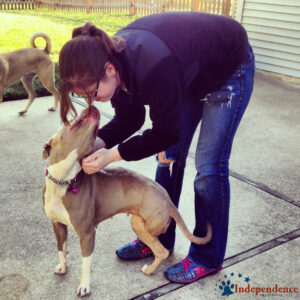Rescue dogs are commonly perceived as “damaged” – is that true?
Many people believe that rescue dogs end up in shelters because they are somehow “damaged.” For the most part, when someone says a rescue dog is “damaged”, they’re referring to behavior issues. Is there any truth to this statement? Is there reason to be wary of dogs that end up homeless? This is a great question, and one that shouldn’t be answered lightly. Adding any dog to your home is an important decision – something you want to get right. If you get it wrong, the dog could end up back at the shelter. This is unfortunate for the dog, but can also be heartbreaking for your family.
So are rescue dogs damaged? In a word, no. Just because a dog ends up in a rescue or shelter does not automatically mean he is in some way damaged. However, the opposite is also true: not every rescue dog is physically, mentally and behaviorally healthy. This is why it’s important to choose wisely. Behavior issues aren’t limited to rescue dogs. There are many ways to acquire a dog, and all can be risky if you don’t do your homework.
How does a dog become damaged?
 Damage is done in many ways. When we think of a damaged dog, we tend to picture a dog from a background of abuse and neglect. It’s true; abuse and neglect can certainly create some negative associations resulting in behavioral issues, sometimes severe. However, not all rescue dogs from backgrounds of abuse and neglect are damaged. Through my work with a local pit bull rescue, I’ve met countless rescue dogs who’ve been through hell and back. A human being could never endure such treatment without deep, permanent scars, but I’ve seen many (if not most) of these rescue dogs emerge unscathed. This is one of the things I love most about dogs – their ability to move on, let the past stay in the past, and just enjoy the present for what it is. Two lessons here: first, every dog will respond differently to bad experiences, and second, dogs often have a high tolerance for bad experiences. It is therefore unwise to assume a rescue dog with a bad past is carrying that experience into the present. That said, it certainly is possible for a rescue dog from a bad background to have behavior issues – that’s why it’s always important to ask questions and to evaluate the dog thoroughly before adopting.
Damage is done in many ways. When we think of a damaged dog, we tend to picture a dog from a background of abuse and neglect. It’s true; abuse and neglect can certainly create some negative associations resulting in behavioral issues, sometimes severe. However, not all rescue dogs from backgrounds of abuse and neglect are damaged. Through my work with a local pit bull rescue, I’ve met countless rescue dogs who’ve been through hell and back. A human being could never endure such treatment without deep, permanent scars, but I’ve seen many (if not most) of these rescue dogs emerge unscathed. This is one of the things I love most about dogs – their ability to move on, let the past stay in the past, and just enjoy the present for what it is. Two lessons here: first, every dog will respond differently to bad experiences, and second, dogs often have a high tolerance for bad experiences. It is therefore unwise to assume a rescue dog with a bad past is carrying that experience into the present. That said, it certainly is possible for a rescue dog from a bad background to have behavior issues – that’s why it’s always important to ask questions and to evaluate the dog thoroughly before adopting.
Damage to the canine mind isn’t just limited to negative experiences like abuse and neglect. Many people who mean well often inadvertently damage a dog. This is especially true of puppies. Despite the common perception that puppies are “safer to adopt” than adult rescue dogs, puppies can actually be very risky. The first twelve weeks of a dog’s life are the most critical in terms of development. A quality, experienced, educated breeder will know at what age different experiences should be introduced. Timing is everything – you need to know when to begin handling the dog, when to being separating the dog from the rest of the litter and for how long he should be separated, when to introduce environmental sights and sounds such as traffic, when to meet new humans, when to socialize with dogs outside the litter, when to let the puppy join his new home, etc. It is certainly possible to “accidentally” raise puppies without any major damage; however, it’s even easier to get it wrong. The perk to adopting an adult rescue dog is that any damage done by improper care during the first few months of life will likely have already emerged. In short, what you see is what you get. When you adopt a puppy with an unknown background, or with a background that was likely to be lacking in proper care (like from a backyard breeder), you run the risk of behavior issues emerging later on.
Breeding a dog isn’t just about raising puppies properly. A dog should only be bred if its temperament and physical health have been thoroughly assessed and found to be of outstanding quality. Nurture accounts for much of a dog’s development, but nurture cannot always overcome nature – you can’t work with what isn’t there. Backyard breeders almost always disregard the importance of breeding only dogs with outstanding physical health and a solid temperament. Sadly, many breeders who are both educated and experienced often overlook the importance of solid temperament as well. This is particularly frequent among breeders (backyard and experienced) who are breeding for certain physical traits. Often those who are breeding to get a dog that looks a certain way overlook the way a dog behaves. As a result, the puppies may very well inherit undesirable personality traits. Nurture is able to overcome much of this, but unfortunately, nurture cannot always overcome nature. This is why it’s important to do your homework no matter how you choose to acquire your dog! Whether you’re adopting a rescue dog from a shelter, or you’re buying a dog from a breeder, don’t be afraid to ask questions!
Can damage be overcome?
Finally, consider what dog training is able to accomplish. Even for rescue dogs without any known behavior issues, life as part of a family in a home may be brand new. For other rescue dogs, they may have gone so long without the proper structure, exercise, and leadership they require that they appear to be out of control! Typically there is nothing wrong with these dogs – all that’s needed is someone to help you set your dog up for success. Professional dog training will help you meet your dog’s needs, will help you explain to your dog where he fits in within your family, and will help you learn how to communicate with your new dog. For dogs with known behavior issues, dog training is even more important! Good intentions and gentle interactions can only go so far toward resolving behavior issues, so it’s best to begin working with a professional as soon as possible. Dog training is important for puppies, too, especially for puppies of unknown backgrounds. Establishing a leadership role with your puppy that is based upon mutual trust and respect will go a long way towards overcoming any bad behaviors before they even arise!
your dog up for success. Professional dog training will help you meet your dog’s needs, will help you explain to your dog where he fits in within your family, and will help you learn how to communicate with your new dog. For dogs with known behavior issues, dog training is even more important! Good intentions and gentle interactions can only go so far toward resolving behavior issues, so it’s best to begin working with a professional as soon as possible. Dog training is important for puppies, too, especially for puppies of unknown backgrounds. Establishing a leadership role with your puppy that is based upon mutual trust and respect will go a long way towards overcoming any bad behaviors before they even arise!
If you’re located in the Delaware Valley region (including southeastern Pennsylvania, Delaware, northeastern Maryland, and southwestern New Jersey) and you’ve just rescued a dog, or you’re thinking about adopting a rescue dog, contact us to start off your life together on the right paw! We are successful with dogs of all backgrounds, ages, breeds and temperaments, and we’re passionate about helping dogs and families live together happily.
